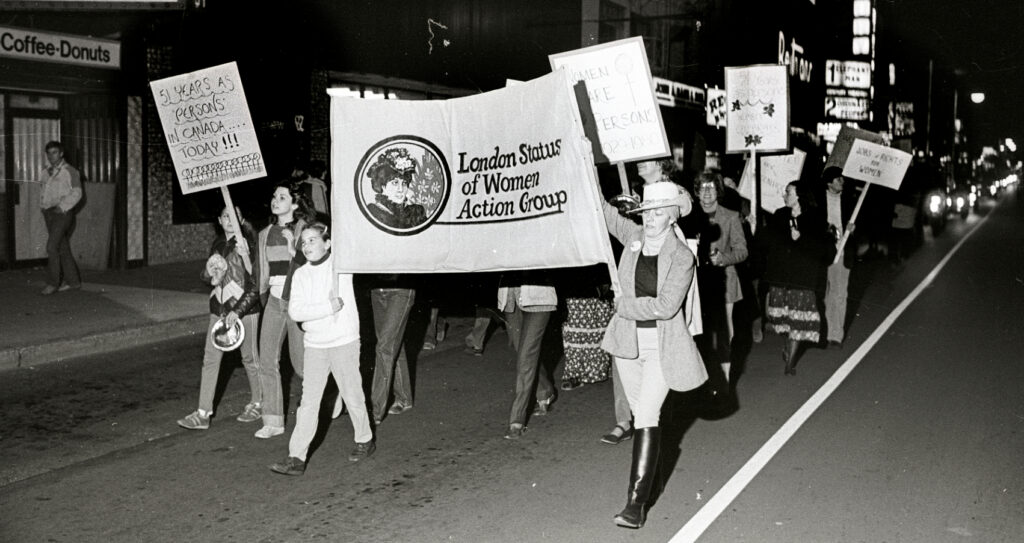
Welcome to the website documenting the work of the London Women’s History Group, a collective formed in 2000 to preserve and celebrate the rich history of women’s activism in London, Ontario. Browse through the site to find a history of the project, information about the LWHG’s book Voices of Change, which profiled London activist women of the 1960s and 1970s, and an interactive map that traces London’s feminist history.
The London Women’s History Group gathered a rich collection of archival material, including oral histories, organizational records of women’s activist groups in London, photographs, manuscript and print material, and donated this collection to the Archives and Special Collections at Western University. Click here for a link to the LWHG Collection Finding Aid.
The London Women’s History Group supports community-based experiential learning opportunities through an endowment at Huron, and has partnered with Huron History students since 2012. Our redesigned website marks 10 years since Huron students helped to create the original Voices of Change website.

New Voices of Change: Our class project and the campus context in 2021
On September 17th, 2021, thousands of students, staff, and faculty gathered in protest in the wake of a series of sexual assaults that occurred on and around Western University’s campus during orientation week. Our class joined the walk-out. Students held signs with messages such as “Empower survivors” and “Western needs to learn and educate,” with crowds chanting and urging for the President of Western University Alan Shepard to take action to change campus culture. Each person who stood on the UC Hill that day demanded change, so that no more students would feel unsafe. Everyone who was on the Western field that day begged for permanent change; if not for them, for a friend, a sister, a cousin, a partner, so that no more women would be harmed. As a school and community, it is crucial that we shed light on the issue of sexual assault on campus and the effects this has on both survivors and their peers. We must fight back for all of the women who have had their choice and consent ripped away from them, and give them time to grieve what was wrongfully taken from them.
 Sexual violence against women has been a recurring topic throughout history, and the fight against it is an important aspect of the activism of feminists who came before us. Completing this project for class made us wonder about the future. How can our modern society still tolerate this recurring historic violence? Although we may think our society has progressed into one that is more equal, the truth is that these heinous crimes still go unpunished and unmentioned every day. We have included this discussion of the events of September 17th, 2021 because we realized that as students, we now contribute to the ongoing legacy of women’s activism within the London community. Once again, women had to protest against the wrongful injustices they face simply based on sex. Women’s activism is not just about the past. The battle for equality and acceptance is still being fought. In saying this, we acknowledge the specific barriers placed in front of racialized, impoverished, and LGBTQIA2S+ women. Even as the revitalization of the London Women’s History Group website celebrates the accomplishments of activists who came before us, there is still work to be done to achieve equality.
Sexual violence against women has been a recurring topic throughout history, and the fight against it is an important aspect of the activism of feminists who came before us. Completing this project for class made us wonder about the future. How can our modern society still tolerate this recurring historic violence? Although we may think our society has progressed into one that is more equal, the truth is that these heinous crimes still go unpunished and unmentioned every day. We have included this discussion of the events of September 17th, 2021 because we realized that as students, we now contribute to the ongoing legacy of women’s activism within the London community. Once again, women had to protest against the wrongful injustices they face simply based on sex. Women’s activism is not just about the past. The battle for equality and acceptance is still being fought. In saying this, we acknowledge the specific barriers placed in front of racialized, impoverished, and LGBTQIA2S+ women. Even as the revitalization of the London Women’s History Group website celebrates the accomplishments of activists who came before us, there is still work to be done to achieve equality.
Land Acknowledgement

We acknowledge that the land on which Huron University College located is the traditional territory of the Attawandaron, Anishinaabeg, Haudenosaunee, Lunaapeewak, and Chonnonton Nations, lands connected with the London Township and Sombra Treaties of 1796 and the Dish with One Spoon Covenant Wampum. With this, we respect the longstanding relationships that Indigenous Nations have to this land, water, and region of southwestern Ontario as they are the original caretakers. We acknowledge the historical and ongoing injustices that Indigenous Peoples (First Nations, Métis and Inuit) endure in Canada, and we are committed to correcting miseducation and renewing respectful relationships with Indigenous communities through our teaching, research and community service. We value the significant historical and contemporary contributions of local and regional First Nations of Turtle Island (North America).